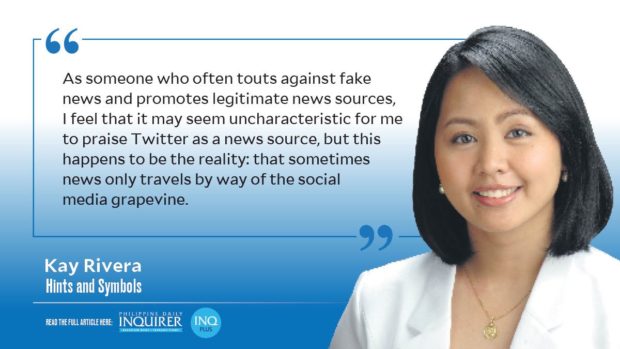Unlikely news sources
Last week, two farmers were killed in Quezon. Armed Forces claim that these were “NPA rebels” and that there was an armed encounter, despite claims from the families that these accusations are false. The community calls for justice. And somehow, the only way I know this is through Twitter.
As someone who often touts against fake news and promotes legitimate news sources, I feel that it may seem uncharacteristic for me to praise Twitter as a news source, but this happens to be the reality: that sometimes news only travels by way of the social media grapevine.
Last year, much ado was made about how pop fandoms and fan-driven spaces have made their large influence known in some surprising arenas like politics and religion. Much of these communities are able to congregate on Twitter, and to a slightly smaller extent these days, via Tumblr or Facebook. Large international fanbases have the numbers, enthusiasm, and organization to impact change on fairly massive scales, from selling out products, to flooding harmful hashtags like #WhiteLivesMatter, to disrupting one of former US president Donald Trump’s rallies on the campaign trail. (Those were fun times.) The influence isn’t always strictly benign — it’s impossible for any group with such numbers to be homogeneously good, and the cancel culture among stan communities is a quick and formidable thing — but it’s clear that Twitter-based spaces are capable of a lot of good and, depending on how you look at it, a lot of damage. And that power is supported by the platform, which allows even those with few resources to join organized movements, and to do so fairly quickly.
I appreciate the way Twitter works for organized movements on a smaller scale, and for a different, if related, purpose: that it makes me privy to community news that I would not usually encounter. Threads on the killings of farmers or small-scale crimes committed by police forces, for example, gain more traction on Twitter and are more likely to come across my newsfeed there versus on Facebook, despite me following largely the same circles of people on both platforms. For example, as of today, the few public posts on Facebook about the killings I mentioned above have engagements in the range of 30 to 50 shares, versus engagement by the hundreds of retweets and likes on Twitter. The range of awareness is affected by the coverage, or lack thereof, by our main broadsheets: the two Google search results of the farmers’ names are from a provincial paper and from a tabloid. Other news coverage has simply referred to those slain namelessly as “suspected rebels,” relying solely on statements by the Armed Forces, without providing context or seeking comment from the victims’ communities.
A lot of discourse on how Twitter has impacted the global political landscape mentions how Twitter has changed the instantaneity of news. In my experience as a person interested in human rights in the Philippines, without Twitter, I might not get these titbits of news at all if they weren’t amplified and multiplied by the platform, and driven by the interest in social justice (and admittedly, indignation) of its users. One of the bookmarks I sometimes refresh is that for a Twitter thread about human rights abuses committed by armed or police forces during the pandemic, with some contributions made by victims or families themselves, complete with receipts and photos. I’ve often tried to cross-check such news with major platforms and come up empty-handed. It’s fairly clear to me that anyone compiling data on, say, human rights violations or the drug war, would need to comb through Twitter as well, and there are journalists and organizations who helpfully keep track of them on the platform. Apart from raising awareness, the app helps too in driving fundraisers for health, funeral, and legal expenses.
While much less ubiquitous than Facebook and perhaps slightly less utilized by Filipinos, Twitter, and how political campaigns use it, will have a significant impact on next year’s elections. Some political bases, unexpectedly savvy, already use the platform for fundraising, information dissemination, and crowdsourcing. The site continues to be invaluable for those of us who are continuously on the lookout for true, but less publicized, stories of how citizens ask for help or seek justice when they are unable to be heard on mainstream news, and find no traction on Facebook. Here’s hoping that well-intentioned political campaigns will be able to harness the site well, and to shine a light where needed.





















